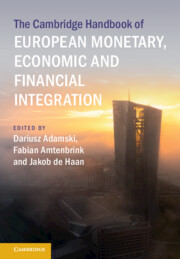Book contents
- The Cambridge Handbook of European Monetary, Economic and Financial Integration
- The Cambridge Handbook of European Monetary, Economic and Financial Integration
- Copyright page
- Contents
- Contributors
- Introduction
- Part I The Economic and Monetary Union
- 1 Conceptual Foundations of Economic and Monetary Union
- 2 Theorizing Economic and Monetary Union
- 3 Monetary Union and the Single Currency
- 4 On the Misalignment of Monetary, Economic, and Political Integration in European Economic and Monetary Union
- 5 Ideas, Interests, and Power
- 6 Coping with Economic Crises through Learning by Doing
- 7 The Political Economy of Reinsurance
- 8 Euro Crises, the Productivity Slowdown, and the EMU
- Part II The Monetary Dimension
- Part III The Economic and Fiscal Dimensions
- Part IV Financial Integration
- Index
- References
7 - The Political Economy of Reinsurance
from Part I - The Economic and Monetary Union
Published online by Cambridge University Press: 28 September 2023
- The Cambridge Handbook of European Monetary, Economic and Financial Integration
- The Cambridge Handbook of European Monetary, Economic and Financial Integration
- Copyright page
- Contents
- Contributors
- Introduction
- Part I The Economic and Monetary Union
- 1 Conceptual Foundations of Economic and Monetary Union
- 2 Theorizing Economic and Monetary Union
- 3 Monetary Union and the Single Currency
- 4 On the Misalignment of Monetary, Economic, and Political Integration in European Economic and Monetary Union
- 5 Ideas, Interests, and Power
- 6 Coping with Economic Crises through Learning by Doing
- 7 The Political Economy of Reinsurance
- 8 Euro Crises, the Productivity Slowdown, and the EMU
- Part II The Monetary Dimension
- Part III The Economic and Fiscal Dimensions
- Part IV Financial Integration
- Index
- References
Summary
Do the euro area reforms over the long decade since 2008 add up to a system of risk-pooling among Member States that share a common currency? Most political economists see the macroeconomic policy architecture as incomplete. The standard for completeness is a fiscal federation in which central and state budgets form a co-insurance scheme for citizens. However, the argument here is that we can see an alternative emerging in the EU: a macroeconomic system of reinsurance. The euro area increasingly has the capacity to insure the ultimate insurers of citizens, the Member States, against catastrophic risks and systemic instability that would overwhelm national capacities. It does so in a variety of ways, not confined to budgetary transfers. In contrast to a fiscal federation, this evolution is a viable macroeconomic alternative on which Member State representatives with very different fiscal traditions can agree. It is less clear whether reinsurance has the same loyalty-generating effects among citizens as co-insurance in a federal polity.
- Type
- Chapter
- Information
- Publisher: Cambridge University PressPrint publication year: 2023
References
- 1
- Cited by



